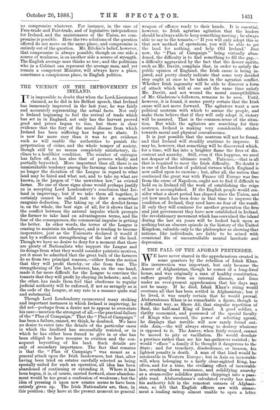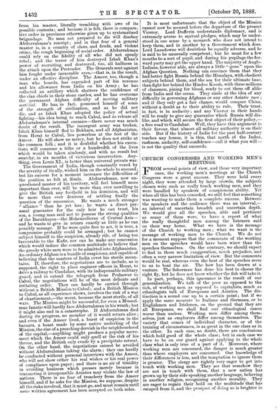THE FALL OF '11:11. AFGHAN PRETENDER.
lATE have never shared in the apprehensions created in some quarters by the rebellion of Ishak Khan His insurrection was important, but only because the Ameer of Afghanistan, though he comes of a long-lived house, and was originally a man of healthy constitution, suffers greatly from an internal disease, and lives under an ever-present apprehension that his days may not be many If he died, Ishak Khan's rising would overturn all that has been settled in Afghanistan; but if he lived, it was nearly certain that he would prevail. Abdurrahman Khan is as remarkable a figure, though in a different way, as Shere Ali, that singular repetition of Saul, the half-mad King of Israel. A good soldier, a thrifty economist, and possessed of the special faculty of Kings who succeed, the power of selecting agents, he displays that terrible will now rarely found out- side Asia,—the will always strong to destroy whatever is opposed to it. The Ameer, when fairly roused, cannot be moved to pity or vacillation. He would desolate a province rather than see his tax-gatherers resisted ; he would " efface " a family if he thought it dangerous to the State ; and for treachery, disobedience, or treason, his lightest penalty is death. A man of that kind would he intolerable in Western Europe ; but in Asia an inexorable will, when belonging to a fairly clear-sighted King, has often, and for a time, the civilising effect of inexorable law, crushing down resistance, and. solidifying anarchy as a steam-roller solidifies granite chippings into a pass- able road. Abdurrahman's calculated cruelty has made his authority felt hi the remotest corners of Afghani- stan, so felt that English officers saw with amaze- ment a leading satrap almost unable to open a letter from his master, literally trembling with awe of its possible contents ; and because it is felt, there is compara- tive order in provinces otherwise given up to systematised brigandage. No man not prepared to die will disobey Abdurrahman's rescript ; and in that fear of a general master is, in a country of clans, and feuds, and violent crime, the rough beginning of social order. Abdurrahman could rely on the fidelity of all who did not openly rebel ; and the terror of him destroyed Ishak Khan's power of recruiting, and destroyed, too, all halfness in the attack upon the Pretender. The Generals sent against him fought under inexorable eyes,—that is, in the result, under an effective discipline. The Ameer, too, though a man who hoards, has expended part of his revenue and his allowance from India on his Army ; he has collected an artillery which shatters the confidence of the clan chiefs in their stone castles, and he has overcome the permanent Afghan difficulty of moving military materiel. He has, in fact, possessed himself of some of the strength of civilisation, and as he did not die, and as Ishak Khan adopted the policy of actual fighting—his idea being to reach Cabul, and so release all Abdurrahman's internal enemies—there never was much doubt of the result. The insurgent army was broken, Ishak Khan himself fled to Bokhara, and all Afghanistan, from Herat to Cabul, lies powerless at the feet of the Ameer. He will show no mercy, but he does not strike at the common folk ; and it is doubtful whether his execu- tions will consume a tithe or a hundredth of the lives Which would be taken aimlessly, and with no result but anarchy, in six months of victorious insurrection. Any- thing, even Louis XI., is better than universal private war. The Government of India, though constantly vexed by the severity of its ally, wished him on the whole to succeed; but his success for a moment increases the difficulties of the position as felt at Simla. Abdurrahman, now un- questioned master of his territory, will feel himself more important than ever, will be more than ever unwilling to give the British any foothold in his dominion, and will be more than ever desirous of settling finally the question of the succession. He wants a much stronger " alliance " than he yet has ; he wants a direct per- sonal guarantee for the only heir he can trust, his son, a young man said not to possess the strong qualities a the Barukhzyes—the Hohenzollerns of Central Asia— and he wants to give in return exactly as little as he can possibly manage. If he were quite free to act, it is true, a compromise probably could be arranged; but he cannot subject himself to the suspicion, already rife, of being too favourable to the Kafir, nor can he make any concession which would induce the common multitude to believe that the greedy white men were to be admitted into Afghanistan. An ordinary Afghan is a bundle of suspicions, and capable of believing that the masters of India covet his sterile moun- tains. If, therefore, the negotiations are to include, as is supposed, the right to place engineer officers in Herat, to drive a railway to Ca,ndahar, with its indispensable military guard, and to extend the telegraph from Peshawur to Cabul, the negotiations will be of the most delicate and irritating order. They can hardly be carried through without a British Mission to Cabul ; and a British Mission to Cabul, as all experience shows, involves the risk of a war of chastisement,—the worst, because the most sterile, of all wars. The Mission might be successful, for even a Mussul- man fanatic will hardly face Abdurrahman in his wrath; but it might also end in a catastrophe. If Abdurrahman died during its progress, no member of it would return alive ; and even if the Ameer lived, a burst of suspicion in the bazaars, a boast made by some native underling of the Mission, the rise of a preaching dervish in the neighbourhood of the capital,—anything might produce a popular move- ment which the Ameer could only quell at the risk of his throne, and the British only evade by a precipitate retreat. On the other hand, the negotiations cannot be avoided without Abdurrahman taking the alarm ; they can hardly be conducted without personal interviews with the Ameer, who will not show either his real wishes or his real power of compliance upon paper ; and there is an air of timidity in avoiding business which presses merely because in transacting it irresponsible Asiatics may violate the law of nations. There is no fear of treachery from the Ameer himself, and if he asks for the Mission, we suppose, despite all the risks involved, that it must go, and must remain until some written agreement has been accepted on both sides. escaped from it, and the prospect of doing so is brighter in It is most unfortunate that the object of the Mission cannot now be secured before the departure of the present Viceroy. Lord Dufferin understands diplomacy, and is extremely averse to mutual pledges, which may be under- stood in one sense by a monarch who does not intend to keep them, and in another by a Government which does. Lord Lansdowne will doubtless be equally adverse, and he is said to be unusually competent ; but he must for a few months be a sort of pupil, and during his pupilage the for- ward party may get the upper hand. The majority of Anglo- Indians, however able, are always a little " gone " upon the Afghan Question. Nothing can convince them that they had better fight Russia behind the Himalaya, with obedient subjects behind them, and the sea for their ultimate base, than fight her behind the Hindoo Koosh, with three millions of clansmen, pining for blood, ready to cut them off alike from India and the ocean. They smile at the idea of any difficulty in governing Afghans or any other Asiatic race ; and if they only got a fair chance, would conquer China, without a doubt as to their ability to rule. Their trust, in fact, is in audacity ; and any Viceroy in their hands will be ready to give any guarantee which Russia will dis- like, and which will secure the first object of their policy,— a free road to Candahar. Well, they have this argument in their favour, that almost all military authority is on their side. But if the history of India for the past half-century teaches any lesson, it is this, that north of the Indus, rashness, audacity, self-confidence—call it what you will— is not the quality that succeeds.



































 Previous page
Previous page